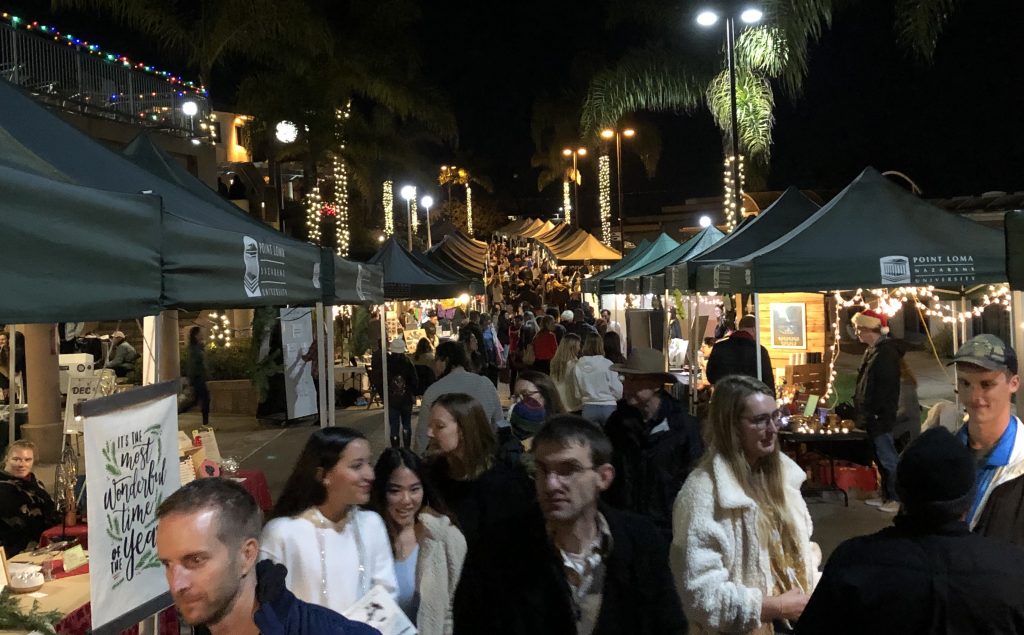During the normal school year, the Center for Justice and Reconciliation (CJR) at Point Loma Nazarene University fills Caf Lane with a variety of different vendors for a night of Christmas shopping with a twist. Each booth has ethically sourced products and is classified as a fair trade business. You won’t find any Shein, Target, Forever 21 nor Amazon products here. Due to the pandemic, the CJR moved this night of meandering among the booths onto a website, containing all your ethically sourced and fair trade needs.
The CJR posted several infographics on their Instagram about ethical gift-giving during the Christmas season, in preparation for the reveal of their website on Nov. 3.
These numbers show the sheer environmental impact of the excess coming from the Christmas season. You might notice that the ethical gift ideas are a bit different than the normal things one might wrap up in red and green paper.
Zach Lyons, a student staff member for the CJR, said the group is trying to change the mindset people have about Christmas shopping.
“[We are] focusing on small businesses, and even this year we have one vendor who thrifted clothes,” Lyons said. “That second-hand purchase is really helpful in combating the fast fashion industry.”
Fast fashion refers to the influx of mass-produced, cheap, trendy clothes manufactured outside the U.S. When the trend dies, the leftover clothes end up in the landfill.
The New York Times reported “More than 60 percent of fabric fibers are now synthetics, derived from fossil fuels, so if and when our clothing ends up in a landfill (about 85 percent of textile waste in the United States goes to landfills or is incinerated), it will not decay.”
Instead of supporting companies that fuel fast fashion, another CJR student staff member, Bridget Stephenson, said this event “is a time to reflect and learn how to start creating habits to combat the harm done to the environment and others through consumerism.”
In addition to ethically sourced clothes, the website has jewelry, art, decor, food, drinks and beauty products. One of the student vendors, Hema Patel, is a Turtle Mountain Ojibwe beadwork artist who creates hand-made Ojibwe-style beaded earrings. She attends Yale University but domestically ships her earrings with recycled materials. Patel shared in her biography on the CJR website, “My auntie Denise and my grandmother Rita taught me to bead. Every teaching they passed to me is a gift, a memory, and a treasure. During quarantine, I found the space and time to create art and these earrings are a source of strength for me in these tumultuous times.”
This event is not only about the gifts, but also an opportunity to hear vendors’ stories and backgrounds. Stephenson said, “A big reason why I’m going to give ethically this season is to educate my family and friends while I am giving them gifts, so it creates a snowball effect. There is a story behind each gift, it is not just a material item.”

Lyons said the website sets itself apart from Amazon and other big businesses.
“We try our best to promote fair trade which means that we promote vendors who compensate their workers fairly, specifically if they’re from other countries,” he said. “We are supporting the movement to compensate whoever is creating the product instead of exploiting them.”
According to Lyons, the fair trade chocolate, coffee and tea is really good.
Although the feeling of being part of the PLNU community at this event may not be possible this year, Lyons said, “It’s important during the Christmas season to shop in ways where you are actually giving back to your communities. This Roots of Giving event is a great way to do that and it’s a great way to feel good about shopping.”
He reminisced on last year saying, “No matter what the cost of it was, I was just excited to buy something knowing that the worker was being compensated fairly and that I was giving back to my community.”
Written By: Elaine Alfaro
